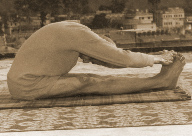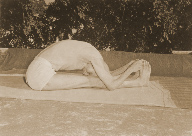Paschimottanasana

| 
|
| Paschimottanasana 001 | Paschimottanasana 002 |
Sit on the ground and stretch the legs stiff like a stick. Catch the toes with the thumb, index and middle fingers. While catching, you will have to bend the trunk forwards. Fatty persons will find it rather difficult to bend. Exhale and slowly bend without jerks till your forehead touches your knees. You can keep the face between the knees also. When you bend down draw the belly back. This facilitates the bending forwards. Bend slowly by gradual degrees. Take your own time. There is no hurry. When you bend down, bend the head between the hands. Retain it on a level with them. Young persons with elastic spine can touch the knees with the forehead even in their very first attempt. In the case of grown-up persons with rigid spinal column, it will take a fortnight or a month for complete success in the posture. Retain the breath till you take the forehead back to its original position, till you sit straight again. Then breathe.
Retain the pose for 5 seconds. Then gradually increase the period to 10 minutes.
Those who find it difficult to do the full Paschimottanasana, can do half pose with one leg and one hand and then with the other leg and other hand. They will find this more easy. After some days when the spine has become more elastic, they can have recourse to the full pose. You will have to use common sense while practising Asanas. Before you practise this, read the instructions on Janusirshasana.
BENEFITS
This is an excellent Asana. It makes the breath flow through the Brahma Nadi, Sushumna, and rouses the gastric fire. It reduces fat in the abdomen. This Asana is a specific for corpulence or obesity and for the enlargement of spleen and liver. Books on Hatha Yoga speak highly of this Asana. The Sarvangasana is for the stimulation of endocrine glands and Paschimottanasana for the stimulation of abdominal viscera, such as kidneys, liver, pancreas, etc. It increases the peristalsis of the bowels. Peristalsis is the vermicular movement of the bowels or intestines by which food and faecal matter are pushed from one portion of the bowels to another. This Asana relieves constipation, removes sluggishness of liver, dyspepsia, belching and gastritis. Lumbago or stiff back and all sorts of myalgia and other diseases of the back muscles are cured. This Asana cures piles and diabetes also. The hip muscles of the abdomen, the solar plexus of nerves, the epigastric plexus of nerves, bladder prostrate, lumbar nerves, sympathetic cord, are all toned up and kept in a healthy, sound condition. Thanks to Paschimottanasana, Sirshasana and Sarvangasana and to the Rishis who first introduced these wonderful Asanas to the students of Hatha Yoga.
